|
Click Here to view this email in your browser
NACDEP Summer 2022 Newsletter
NACDEP Colleagues: Greetings and welcome to the summer 2022 edition of the NACDEP newsletter. It was wonderful to get together in Indianapolis. There were times during the lockdown when I wondered if we would ever be able to have these kinds of events again.
We have a nice and informative summer newsletter for you and I hope you will read all the entries. Remember, it takes contributions from members like you to make the newsletter a success.
And speaking of your contributions, this is the final call for you to complete the survey on the NACDEP Conference in Indy. I want to extend a special thanks to all of the attendees who have already completed it, and encouragement to those of you who attended but have not submitted it yet. Here is the link: https://purdue.ca1.qualtrics.com/jfe/form/SV_eKgShCDbVGuGlHn
Now, enjoy the newsletter!
Sincerely,
Thomas W. Blaine, PhD
Associate Professor
Ohio State University Extension
NACDEP Newsletter Editor
President's Column
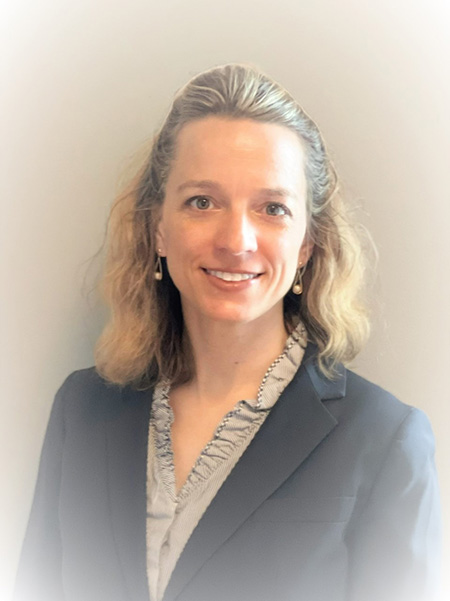
Submitted by Rebekka Dudensing, NACDEP President
Wow! An Exciting Time in Extension Community Development and NACDEP
Wow! What an exciting time to be an extension community development professional! Last month, we met in person for the first time in two years, and it was so good to see old friends and meet new ones in real life. Let’s give a hand to the Indy conference team; they did an amazing job. I think we all left Indianapolis exhausted but re-energized. Check out the conference highlights.
Now we get to keep that momentum going and create the wow in the year ahead! Has everyone had the opportunity to sign up for a committee? If not, you can learn more about committee opportunities at this link. Email committee chairs with questions or to join. If you want to get involved but don’t know where to start, email me at [email protected].
We also need people to help with the 2023 conference in Idaho. We especially need people to help organize the presentation sessions. Email Katie McFarland ([email protected]) to learn more.
Beyond where we’ve been (Indiana), where we are (working together through committees), and where we’re going next (Coeur d'Alene, Idaho), there are other reasons to be excited. We work for extension—bringing university resources to people all across our states and country. The conference presentations and posters showcasing your work demonstrate your commitment to your communities. You tackle tough issues and wicked problems, and you bring people together. You build them up into strong communities that celebrate the strengths their diversities provide. You help them create resilient economies and vibrant arts, culture, and food environments.
One more time--Wow! You’re amazing! I’m so excited that I get to work with and serve you this year.
Rebekka Dudensing, NACDEP President, 2022-23
Pipeline to Promotion is Ongoing Right Now!
Submitted by: Cheryl A. Newberry
Oklahoma State University Extension
The National Association of Extension Program & Staff Development is pleased to announce the 2022 Virtual Summer School webinar series July 11-15, 2:00-3:00 p.m. Central!
Join us each day as we explore the "Pipeline to Promotion" in understanding today's potential employees as well as engaging current employees in meaningful ways through capacity building and succession planning.
The information on speakers, topics and the unique daily registration links can be found on the NAEPSDP upcoming webinar page at this link!
https://naepsdp.wildapricot.org/Upcoming-Webinars

This Year the Regional Rural Development Centers (RRDCs) Celebrate its 50th Anniversary by Honoring the Enactment of the Rural Development Act
Submitted by Carmen Kelly
Southern Rural Development Center
The Rural Development Act was passed into law on August 30, 1972, to unify multiple rural development initiatives into a single piece of legislation which, along with many outcomes, led to the Centers’ establishment. The RRDCs play a vital connecting role in rural America, linking the research and educational outreach capacity of the nation's public universities with communities, local decision-makers, entrepreneurs, families, farmers, and ranchers to help address a wide range of rural development issues. Throughout the year, the RRDCs collaborate with key partner organizations who have taken actions to formally recognize the Centers’ significant contributions over the past 50 years and anticipate their leadership roles in the continual vibrancy of rural America.
Additionally, the Centers are hosting programs to highlight the successes and impacts of their first 50 years of service to rural America and to prepare for the emerging opportunities and challenges of the future.
The country’s four Regional Rural Development Centers are:
- the North Central Regional Center for Rural Development, based at Purdue University and serving 12 states through 34 Land-Grant colleges and universities;
- the Southern Rural Development Center, based at Mississippi State University and serving 13 states, Puerto Rico, and the U.S. Virgin Islands through 30 Land-Grant colleges and universities;
- the Northeast Regional Center for Rural Development, based at the Pennsylvania State University and serving 12 states and the District of Columbia through 16 Land-Grant colleges and universities; and,
- the Western Rural Development Center, based at Utah State University and serving 13 states, American Samoa, Guam, Micronesia, and the Northern Marianas through 30 Land-Grant colleges and universities.
Learn more about the Regional Rural Development Centers at: https://rrdc.usu.edu/
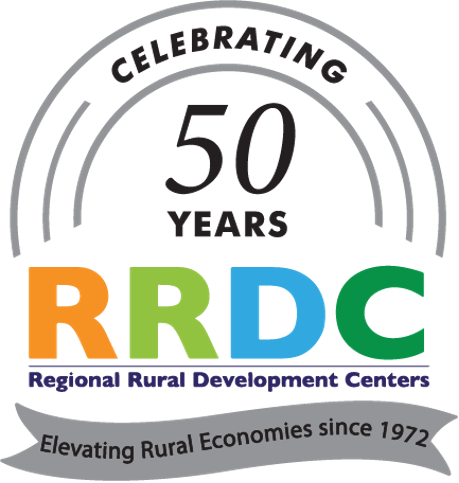
2024 NACDEP Conference Site Selection
Submitted by Melinda Grismer, NACDEP Past President
NACDEP is currently seeking a site for its 2024 conference. Applications are open to land-grant institutions in the South and 1890 LGUs. Three examples of past conference applications are available at https://www.nacdep.net/2024-site-selection-files, along with the current application for the 2024 NACDEP conference. Send applications to [email protected] cc: Past President, Melinda Grismer, [email protected].
Please feel free to reach out to any of the members of the 2024 NACDEP Site Selection Committee or Past Presidents/Conference Organizers (for advice):
Site Selection Committee Members:
Past President, Melinda Grismer
President, Rebekka Dudensing ([email protected])
President-Elect, Crystal Tyler-Mackey ([email protected])
Southern Region Representative, Matt Ulmer ([email protected])
1890s Representative, Joy Moten-Thomas ([email protected])
Past Presidents/Conference Organizers:
2015 NACDEP Conference, Little Rock, AR: Stacey McCullough ([email protected])
2018 NACDEP Conference, Cleveland OH: David Civittolo ([email protected])
2019 NACDEP Conference, Ashville, NC: Susan Kelly ([email protected])
Watch the video on our NACDEP YouTube channel for tips and tricks for putting together an application: https://www.youtube.com/watch?v=9KK2sDNLHRw
TXFED Helping Farmers Markets and Food businesses Thrive Nation Wide
Submitted by Rebekka Dudensing
Texas A&M AgriLife Extension and NACDEP President
The Texas Food Education & Discovery network (TXFED) is not just for Texans. Thirteen collaborating organizations collaborate on course outlines and content with input and content provided by more than 50 knowledgeable new farmers and farmers market organizers. The first 9 online, on-demand courses, which are available in with closed captioning and Spanish subtitles, cover marketing topics useful to farmers, other food businesses, and farmers market managers.
Current topics for farmers include whether selling at a farmers’ market is right for your business, selling at the farmers market for beginners, and beginners guide to using social media to build your farm. Courses for farmers market managers include how to create a welcoming farmers market for SNAP shoppers, introduction to measuring your farmers market impact, and using Instagram to promote your farmers’ market. The course on presenting at conferences is applicable to a range of audiences. Several more courses, including news media training and how to use SNAP at a farmers’ market, are in development.
Visit https://www.txfed.org/ to explore courses. Check back for updates to the course roster. TXFED is funded in part by a grant from the USDA Agricultural Marketing Service, Farmers Market Promotion Program.

"Naturally Florida" Celebrates One Year
Submitted by Lara Milligan
Naturally Florida is a podcast teaching about Florida’s natural areas and the wild things that live there. Lara Milligan and Shannon Carnevale with UF/IFAS Extension Pinellas and Polk Counties, respectively co-host the podcast…
It seems podcasting is slowly creeping its way into Extension as another tool to increase our reach. As we celebrate one year since the launch of our podcast, “Naturally Florida”, we thought it would be appropriate to share our reflections on the experience, and perhaps inspire you to start your own.
From 2015-2020, we offered a “Wildlife of Florida” webinar series as another way to reach our clientele. When the pandemic struck, we were already well versed with webinar productions and decided to jump at the opportunity to try something new and different for extension: podcasting.
After talking with other podcasters around the state, the same general advice kept coming up, “Just start!”. A little easier said than done, but after a lengthy amount of research on equipment, platforms, and process, we followed the advice we received. On June 21, 2021, “Naturally Florida” was launched. It was a nerve-wracking, but exciting experience.
“Naturally Florida” launched with three-episodes and a commitment to publish one new episode every month. We have stuck with this goal and now have 16 episodes published with over 10,200 plays. The last three podcast episodes have an average download rate of 74 within seven days of release indicating performance among the 25% of podcasts on the market[1]. It has proven to be an amazing outreach tool, far surpassing our reach with webinars. Not only have we expanded our reach in terms of number, but we are reaching new clientele not previously reached with more traditional extension programming.
Recently, we saw a switch in our demographics from a female dominated listening audience to a male dominated listening audience. The latest data shows the listening audience is 53% male, 45% female, and 2% non-binary. We have also been able to reach a significantly younger clientele base than traditional extension programs. The age data shows 95% of the listening audience is under the age of 60 with 56% under the age of 34.
Due to the difficult nature in which to evaluate the success of a podcast, we trialed the publication of a short episode asking listeners to complete a brief survey. This episode had 272 plays, and faculty received 22 responses for an 8% response rate. Results showed 82% reduced
the amount of pesticides used in yard care, 64% installed native vegetation to improve wildlife habitat, and 50% removed an invasive species from their landscape. These results highlighted the potential impact of “Naturally Florida”.
“Naturally Florida” was designed to reach Florida residents and visitors who are dependent on natural resources but may be unfamiliar with the state’s ecology and ecosystems. We research, plan, record, edit, publish, and promote each episode. Topics covered to date include native and invasive species, stormwater, urban forestry, and fire ecology.
Please consider sharing Naturally Florida with family, friends, and colleagues to help us reach more people with critical natural resource information. And you can consider starting a podcast of your own! Naturally Florida is available on all major podcasting platforms. More information, including a media kit with downloadable flyers is available at www.naturallyfloridapodcast.com.
If you have any questions, please don’t hesitate to reach out to us: Lara Milligan, [email protected] or Shannon Carnevale, [email protected]
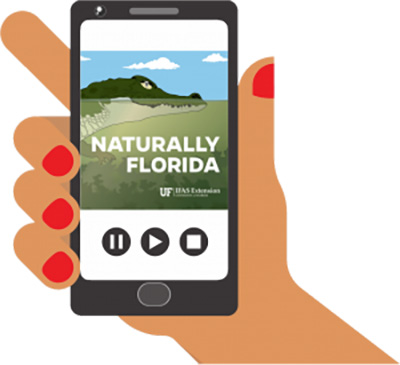
View My YouTube series on the War in Ukraine
Thomas W. Blaine, PhD
Associate Professor
Ohio State University of Extension
NACDEP Newsletter Editor
As many of you are aware, I initiated a YouTube series in 2021 with Ohio State University called Earth is Our Home, where I examine existential threats to our civilization. I recently added a three-part series examining the War in Ukraine, as I have taught and traveled extensively in Ukraine, I speak the Russian language, and have perspectives that I would like to share based on my experiences, observations, military background and education in foreign affairs. I visited the war zone in 2015 and 2016, just between one and two years after the first war when Russia took Crimea from Ukraine.
I invite you to watch the three half hour segments of the series, which provide insight about the causes of the war, the role of the United States, and the threat of escalation to the use of nuclear weapons, as well as the most realistic way to bring about a peaceful conclusion to the fighting. I invoke the method of Realpolitik, placing practical considerations at the forefront rather than ideological or moral assessments.
In part 1, I discuss the long and tangled history of Russia/Ukraine since the Middle Ages. Ukraine did not exist as an independent country until 1991. On the other hand, Medieval Russian Tsars ruled from Kiev, now the capital of Ukraine: https://www.youtube.com/watch?v=Wa6vb40ztJw
In part 2, I explain why the war is not just a war between Russia and Ukraine, but a proxy war between Russia and NATO, which essentially means between Russia and the United States. I display a screen capture from Russian television where the commentators show a map revealing that Russia could destroy three European capitals (Berlin, Paris and London) in less than 4 minutes from launch with its nuclear Sarmat RS 28 rocket. https://www.youtube.com/watch?v=HEv_zA_ni7w
In the third and final part I discuss the most realistic way to end the war. It is through direct diplomacy between the US and Russia. As is always the case in diplomacy, each side must be prepared to give up on things they value, and it is likely that no one will be satisfied with the results, including Ukrainians. But if both sides pursue this route, Ukraine will be able to keep its independence and we will all be able to avoid a nuclear catastrophe. https://www.youtube.com/watch?v=vNPfuLkFrrw
The series is also available on the NACDEP YouTube channel.
Feel free to contact me with questions of comments on the series, and to share with colleagues, clientele, and the media. My email is [email protected] and my phone is 330-466-7877.
Sincerely,
Tom
Save the Date and RFP for PILD 2023
Submitted by Ramona Madhosingh-Hector
University of Florida Extension
The Public Issues Leadership Development (PILD) Conference 2023 is set for April 16-19 in Arlington Virginia. The theme for the conference is year-round advocacy. Proposals for presentations are due by October 15, and applicants will be notified of selection by November.
Here are the links to the request for proposals (RFP) and the conference notice (save the date):
PILD RFP
PILD Save the Date
Registration Open for Community Coaching Circle
Submitted by Tanya Hall
Purdue Extension
As a community development practitioner, at some point we will all be involved with coaching or guiding community groups. Oftentimes, folks think they can just wing it based on experience or it seems “easy.” I’d encourage you to consider being intentional with this work by honing your community coaching skills.
Through participating in this learning community, you will:
- Increase your knowledge of the principles and practices of community coaching
- Reflect on and increase your self-awareness of your role in different groups
- Identify your community coaching style and personal philosophy
- Deepen your capacity to coach community groups in a variety of situations
- Build a network of colleagues to support continued learning and practice
- See/hear several of your colleagues featured in the videos or podcasts
Once registered, access to the learning community non-credit course will open on September 12th and have live Zoom meetings every other Monday, 2:00-3:30 pm ET from September 19 - November 28, 2022. The meetings will include small group discussions. To be fair to fellow group members, participants must be available to attend all meetings. Participants will have approximately 1.5 hours of online coursework between meetings consisting of reading, videos and self-reflection exercises. Space is limited.
A prerequisite to the Community Coaching Learning Circle is experience working with community groups/teams, in particular guiding these groups/teams through the process of achieving their goals.
The cost for the course is $450. Early bird registration cost is $400 if registered by August 22, 2022, using code EARLYBIRD. Registration closes on September 7, 2022. Registration can be accessed at https://bit.ly/3HQxn1D.If you have questions, please reach out to Tanya Hall at [email protected].
Join us in congratulating our 2021 NACDEP Award Winners!
Submitted by Tamara Ogle
We will feature a few of our national winners in each newsletter. This is another opportunity to share some of the great community development work of our NACDEP members.

Oh, the Places You Will Go with NACDEP!
Susan A. Kelly, 2022 Distinguished Career Award Winner
I never could have imagined, that finding a NACDEP flyer after doing a Google search for “community development extension”, would have changed the trajectory of my career in Extension. From serving NACDEP as a committee member, to committee chair, to regional representative, to conference co-chair and finally in the three Presidential positions, I have been able to learn the organizational roles and grow as a professional through that process.
During my career in Extension, I have always been an extension director with a community development appointment. To me, this work has been most satisfying because of the impact that can be made using community development strategies that I learned through study but also from my colleagues in NACDEP. To be able to see organizations form and strengthen, facilitate important community conversations, help entrepreneurs start small successful businesses has been a highlight of my career.
Now that I am Assistant Director of Extension, County Operations, at North Carolina State University, I hope to continue to influence others in understanding Community Development Extension work and how valuable it can be to our community partners. I believe that NACDEP should continue to work. to bring those county directors or others with part time CRD appointments into our family, as there are a large number of them who would greatly benefit from the professional development and networking NACDEP offers.
Receiving the Distinguished Career Award last month was the honor of my career and I sincerely thank all NACDEP members for the love and support I have received over the years. I
look forward to going back to committee work and enjoying serving the best professional association in Extension!
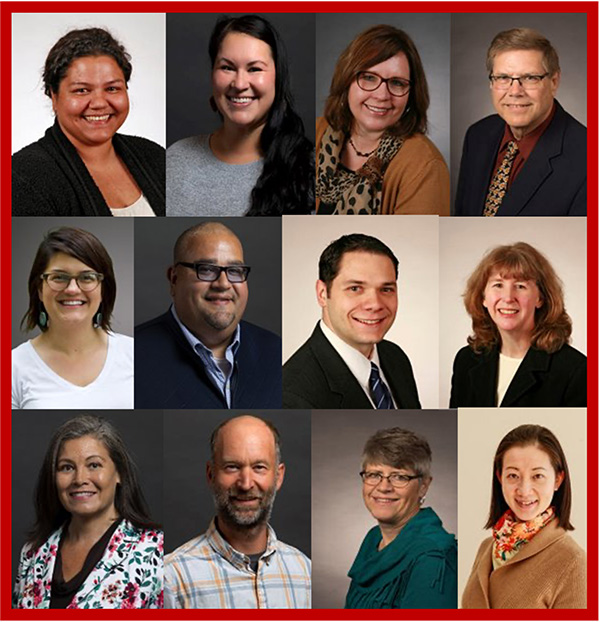
2022 NACDEP Innovation and Creativity Team Winner and Creative Excellence Award Sponsored by JCEP
Building Capacity for Economic Development in Indian Country
Fawn Sampson, Jason Schlender, Dawn Newman, Xinyi Qian, Bruce Schwartau, Holli Arp, DeeDee LeMier, Rani Bhattacharyya, Jody Horntvedt, Lisa Hinz, Ryan Pesch, John Bennett, and Neil R. Linscheid
The University of Minnesota Extension Center for Community Vitality received a matching grant from the United States Economic Development Administration to support economic development work with Tribal Nations in Minnesota from 2019-2021. We started by hiring new American Indian staff to work alongside our Educators who were ready to engage in new ways to broaden and deepen the way we connect to and work with Indigenous communities.
The work we accomplished during the grant period has changed how we approach our work and how we strive to center Indigenous values and people in the planning, design and delivery of programming. Several themes emerged that are important to our Center throughout the process and going forward. They include:
- Developing relationships across cultures
- Collaborating and developing networks
- Providing education support and training to new audiences
Developing relationships across cultures: The emphasis on relationship building and placing Dakota and Ojibwe cultural values to the forefront of the work put the focus on us, as University staff, to better understand the context around community and economic development in and around Tribal Nations who share geography with Minnesota. Our early projects helped us find a niche and work to build trust in a variety of areas. The Minnesota Indigenous Leadership Network provided a platform for Indigenous communities to connect to the University. Hosting a variety of Open Conversations helped us develop visibility by providing an accessible and useful forum for people to connect to each other on challenges related to development. The podcast,Indigenized Connections on Air, focused on sharing the leadership journey of Tribal leaders across Minnesota and hear their views on the most pressing issues in economic development. These efforts and conversations initially opened doors to other possibilities and continue to do so.
Collaborating and developing networks: While this builds off the first theme it focuses more on understanding networks of which Tribes were a part. We explored the issues or challenges they wanted to address, made connections to other external networks and resources, and created working relationships that led to opportunities for future collaborations on programs and projects. The virtual conference Indigenizing Economic Growth: Facilitating Connections and Cooperation in Indian Country in Minnesota is a good example of how we approached this work. The work we did to build relationships with Tribes to better understand their approach to economic development introduced us to entrepreneurs, Tribal government support services, community leaders, Tribal colleges, 1994 Extension programs, and resources focused on economic growth. The conference itself was an opportunity to showcase some of the innovative enterprises being developed in Tribal communities, explore some of the challenges for development, and engage in extended conversations about what type of development is currently happening to explore possibilities for the future. It served as a way to reshape the discussion away from a deficit approach to an asset-based approach focused on exploring all the exciting opportunities underway in Indigenous communities across Minnesota. This was important for us as an institution to understand, but also an important key to shaping how we will continue to partner with Tribal Nations in Minnesota.
Providing education support and training to new audiences: The Open Conversations Program was a key educational focus that helped communities frame issues that affected them and explore ways to use that information to develop stronger networks and collaborative teams. The open conversations were a starting point for deeper work in and between Tribes and organizations across the state. We are currently creating educational programming with one of the casinos which is helping them address their workforce and leadership development issues and pave the way for employees to grow in place. Additionally, our developing relationships with the Tribal colleges and regional universities will help us connect resources to a development agenda through professional certificates and training.
Due to this intentional work, more than half of our educators are now engaged in communication, projects or programming in and around Tribal communities. We believe this is just the beginning of our shared programming which will strengthen and grow in the future.
We also would like to recognize a few of our 2021 Winners:
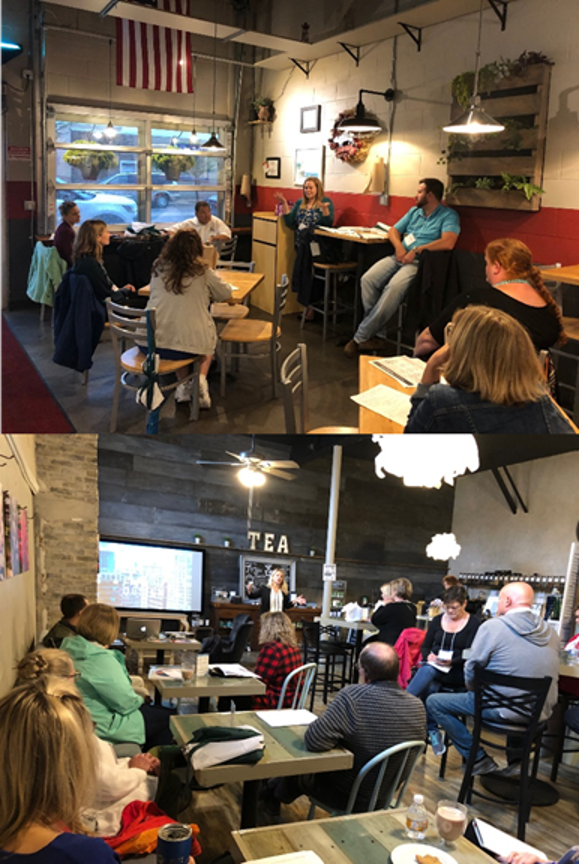
2021 NACDEP Excellence in Teamwork Award Winner
Connecting Entrepreneurial Communities-A Multi-State Showcase
Andy Hayes, Kathy Jamieson, Parker Jones, Diane Longanbach, Andy Northrop, David Rowley, Andrea Bowman, Jodi Bruns, Carla Snyder, Joshua Hofer, Peggy Schlecter, Rani Bhattacharyya, Jennifer Hawkins, Ashley Bales, Michael Krauch, Sarah Low, Hannah McClure, Stephen Mukembo, Jackie Spainhower, Kurt Mantoya, Marilyn Schlake, Stephen Meno, and Jared Reynolds
The Connecting Entrepreneurial Communities (CEC) conference is a dynamic coalition that educates on entrepreneurship systems development. The conference deepens attendee’s learning by embedding highly interactive educational sessions within innovative local businesses. This model has been implemented, or is being explored, by Michigan State, North Dakota State, Pennsylvania State, University of Missouri, South Dakota State, University of Minnesota, University of Nebraska and New Hampshire Cooperative Extension.
In 2020, each partner saw significant need for, but challenges to providing, CEC programming. To respond, the coalition collaborated to host a weeklong virtual conference in November 2020. The resulting CEC Multi-State Showcase reached over 300 individuals through 28 sessions that provided new ideas, skills and connections.
Attendees indicated that they could apply ideas or skills learned at the conference in their community (97%), that they made new connections who can help them bring conference practices to their community (92%) and that they would attend the program if it was offered again (100%). The Showcase demonstrated a means for leveraging multi-state programming to connect local conference attendees to best practices and peers at a regional, or national level.
Connecting Entrepreneurial Communities (CEC) Conference: https://www.canr.msu.edu/cec/
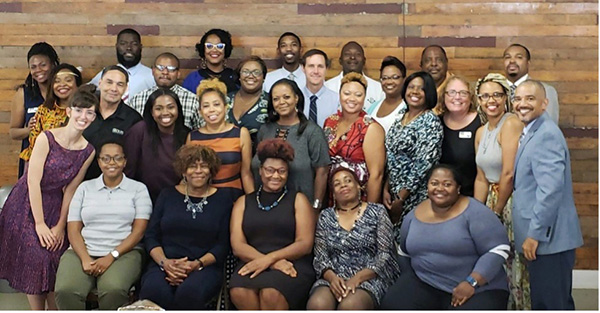 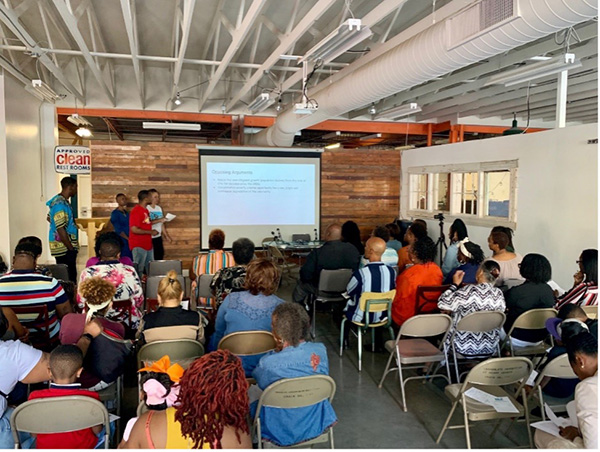
2021 NACDEP Diversity Team Award Winner
Neighborhood Leadership Fellows
Claire Wolff Rippel & Dwayne T. James, University of Missouri Extension
Neighborhood Leadership Fellows is an advanced leadership training program developed by the University of Missouri Extension in partnership with University of Missouri - St. Louis and the St. Louis Economic Development Partnership. Launched in 2018, the program was created as a response to the racial and geographic disparities reported on boards, commissions, and in other civic decision-making bodies. The primary geographic focus area is neighborhoods within the federally designated St. Louis Promise Zone due to the well-documented need for more targeted investment there.
NLF selects 25 Fellows every year for a 9-month opportunity to strengthen their leadership muscles and build ties among their cohort in order to collaboratively create long-term systemic change. With the knowledge of communication, conflict management, data analyzing, community organizing, power-mapping, and advocacy practices, participants gain skills and strength to step into roles of power in the community. By having a seat at the decision-making tables and the training to serve, Fellows are positioned to move systems to affect change around diversity and equity. Increased community-driven leadership from neighborhoods in the St. Louis Promise Zone footprint ultimately will lead to equitable policies that produce positive revitalization, reduced segregation, and improved quality of life for all.
Learn more at: http://cwc.umsl.edu/nlf/
Position announcement for Director of the Center for Local Government Finance and Policy at Michigan State University (MSU).
Submitted by Craig Carpenter
Michigan State University Extension
MSU Extension and the Department of Ag., Food, and Resource Economics invite applications for a full‐time appointment as Director of the Center for Local Government Finance and Policy. In brief, the academic rank is Ass. or Asst. Professor (fixed-term) with a 3-year rolling appointment and a 100% Extension/Outreach assignment. The role of the Director is to provide leadership, engage in outreach/education and conduct applied research in support of Michigan local governments. Details regarding the position can be found here: https://careers.msu.edu/en-us/job/511331/astasc-prof-fixed-term.
Please share with those you think may have an interest in the position.
Purdue Extension is hiring a Community Development Regional Extension Educator in Economic & Business Development
Job Summary
Community Development (CDEXT) Regional Extension Educators lead thematic area activities, including resourcing, developing, implementing, and evaluating Signature Extension Programs in collaboration with Extension specialists, Extension educators, and other stakeholders. In this role, you will:
- Contribute to strategically building and supporting a strong CDExt Extension team of Extension specialists, county/regional Extension educators with an appointment in CDExt and other related fields or program areas, including leading entrepreneurship and economic development-related Extension efforts
- Engage Extension specialists and county/regional Extension educators in the development, evaluation and refinement of Signature Programs and technical assistance activities, including collaboration with the Agribusiness Initiative, Purdue Institute for Family Business, Purdue Center for Regional Development, and other relevant partners at Purdue University (the College of Agriculture, the Department of Agricultural Economics, etc.)
- Develop, implement and evaluate curricula and training programs that equip Extension educators with core skills needed to build vibrant and effective CDExt Signature Programs
- Conduct applied research in support of the CDExt Extension program and remain abreast of current research and other developments in community development, including developing and supporting robust applied research and Extension programs for business and economic development
- Acquire extramural funding and fees to support the CDExt Extension programs and staff salary savings
- Actively participate in professional activities at the university, state, North Central Region, and national levels, including supporting CDExt Diversity, Equity, Inclusion, and Access programs and initiatives
Required:
- Masters degree
- 4 years of experience working in a professional role in the Cooperative Extension Service system or closely related areas of work, such as community colleges/adult education programs; community-based organizations; state, regional, or local community/economic development organizations/agencies; community/economic develop oriented foundations; or entrepreneurial or small business enterprises
- Experience planning, implementing, and evaluating educational programs (relevant experience in other related areas of work will be considered as well)
- Expertise in Community Development’s thematic area of Economic & Business Development and ability to incorporate innovative approaches for expanding Extension’s reach to CDExt audiences
- Strong working knowledge of economic development theories and practices
- Excellent writing and communication skills
- Ability to work with diverse team members
- Strong analytical and problem-solving skills
- Knowledge and experience planning, implementing, and evaluating educational programs
- Capacity to work and function successfully in a team environment
- Travel
Preferred:
- Masters degree in Agricultural Economics, Economics, Sociology, or related disciplines
- Proficiency in using economic development databases (ie. EMSI, Hoovers, Chmura, etc.), economic impact analysis software (i.e., IMPLAN), Geographic Information Systems software (i.e. ArcGIS) and Statistical analysis software.
Additional Information:
- Purdue will not sponsor an employment related visa for this position.
- A background check will be required for employment.
- FLSA: Exempt (Not Eligible for Overtime)
- Retirement Eligibility: Defined Contribution Immediately
- Purdue University is an EOE/AA employer. All individuals, including minorities, women, individuals with disabilities, and veterans are encouraged to apply.
Facebook
Twitter
One Last Thank You to Our sponsors and Exhibitors
https://virtual.oxfordabstracts.com/#/event/2658/exhibitors
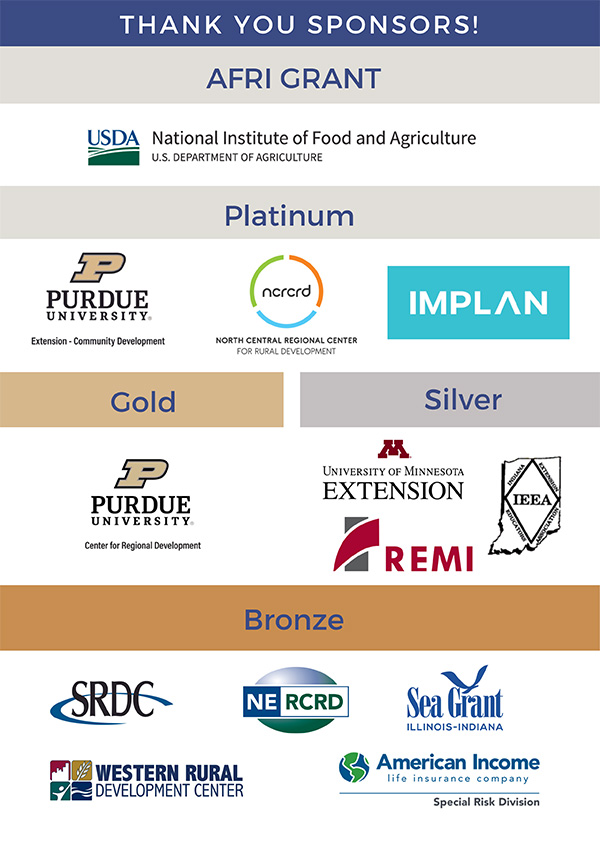
|